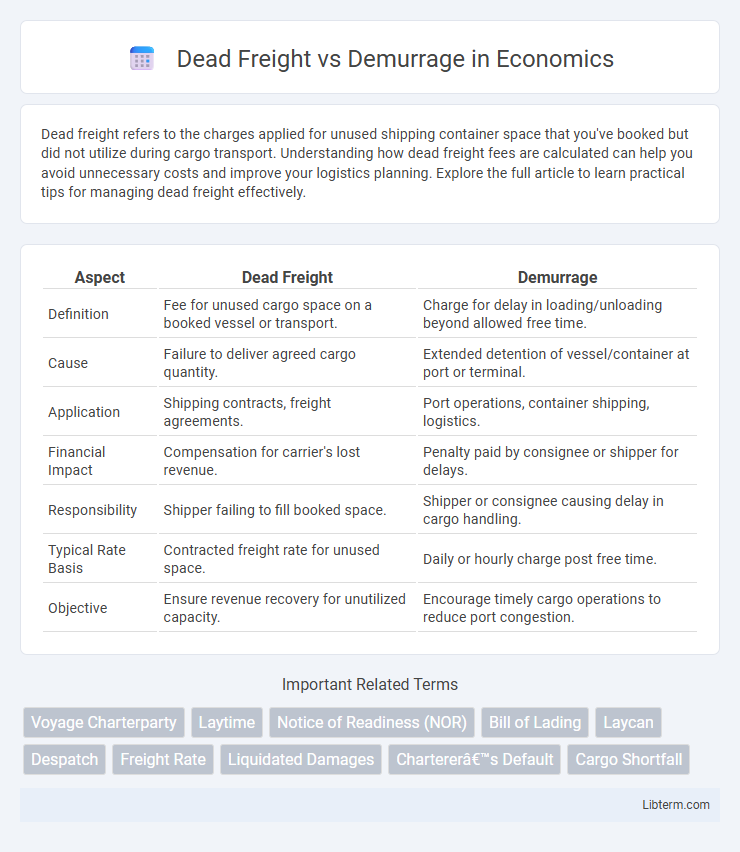Dead freight refers to the charges applied for unused shipping container space that you've booked but did not utilize during cargo transport. Understanding how dead freight fees are calculated can help you avoid unnecessary costs and improve your logistics planning. Explore the full article to learn practical tips for managing dead freight effectively.
Table of Comparison
| Aspect | Dead Freight | Demurrage |
|---|---|---|
| Definition | Fee for unused cargo space on a booked vessel or transport. | Charge for delay in loading/unloading beyond allowed free time. |
| Cause | Failure to deliver agreed cargo quantity. | Extended detention of vessel/container at port or terminal. |
| Application | Shipping contracts, freight agreements. | Port operations, container shipping, logistics. |
| Financial Impact | Compensation for carrier's lost revenue. | Penalty paid by consignee or shipper for delays. |
| Responsibility | Shipper failing to fill booked space. | Shipper or consignee causing delay in cargo handling. |
| Typical Rate Basis | Contracted freight rate for unused space. | Daily or hourly charge post free time. |
| Objective | Ensure revenue recovery for unutilized capacity. | Encourage timely cargo operations to reduce port congestion. |
Understanding Dead Freight: Definition and Context
Dead freight refers to the charges payable by a shipper for reserved but unused cargo space on a vessel, ensuring the carrier is compensated even when the booked cargo is not loaded. It typically occurs in shipping contracts when the shipper fails to deliver the agreed tonnage, impacting the shipping line's revenue and scheduling. Understanding dead freight is crucial for managing contract obligations and minimizing financial losses in maritime logistics.
What Is Demurrage? Key Concepts Explained
Demurrage refers to the charges payable to a shipping company or carrier when cargo exceeds the agreed free time for loading or unloading at a port or terminal, leading to delays and additional costs. Key concepts include free time, which is the allowable period for cargo handling without extra fees, and demurrage fees that apply daily once free time expires, incentivizing efficient cargo movement. Understanding demurrage is crucial for supply chain management, as it directly impacts operational costs and vessel schedules.
Dead Freight vs. Demurrage: Core Differences
Dead freight refers to the charge levied for unused cargo space on a booked shipment, ensuring the carrier is compensated even when the shipper fails to meet the agreed volume. Demurrage is the fee imposed for delays in loading or unloading beyond the agreed free time, covering the cost of vessel or container detention. The core difference lies in dead freight penalizing underutilization of space, whereas demurrage addresses time-related delays in cargo operations.
Common Scenarios for Dead Freight Charges
Dead freight charges typically arise when a shipper books space on a vessel but fails to deliver the booked cargo, leading to lost revenue for the carrier. Common scenarios include last-minute cargo cancellations, underloading of containers, and discrepancies between booked and actual cargo volumes. Carriers impose these fees to compensate for the underutilized capacity and maintain operational efficiency.
When Does Demurrage Apply? Typical Situations
Demurrage applies when cargo remains on a vessel or in a container beyond the agreed free time for loading, unloading, or customs clearance, leading to detention fees. Typical situations include delays caused by strikes, inefficient port operations, or documentation issues that prevent timely cargo movement. Shipping contracts or bills of lading usually specify free time limits, after which demurrage charges are incurred to compensate for the extended use of shipping resources.
Legal Implications: Dead Freight and Demurrage
Dead freight and demurrage both carry significant legal implications in maritime law and shipping contracts. Dead freight refers to the charterer's obligation to pay for the agreed cargo space even if it remains unused, often leading to disputes over contract performance and compensation. Demurrage imposes financial penalties on charterers or consignees for delays beyond the agreed laytime, with legal consequences focused on breach of contract and timely cargo handling.
Impact on Shipping Contracts and Agreements
Dead freight occurs when a charterer fails to utilize the agreed cargo space, leading to financial liability for unused capacity under shipping contracts. Demurrage arises from delays in loading or unloading beyond the agreed laytime, resulting in additional charges imposed on the party responsible for the delay. Both dead freight and demurrage clauses significantly impact contractual obligations by defining penalties and liabilities, thereby influencing risk allocation and operational efficiency in maritime shipping agreements.
How to Avoid Dead Freight and Demurrage Costs
To avoid dead freight and demurrage costs, ensure precise cargo volume forecasting and accurate booking to prevent underutilized shipments or container shortages. Implement efficient loading and unloading schedules, coordinate closely with shipping lines, and secure timely customs clearance to minimize delays that trigger demurrage fees. Utilizing integrated supply chain management software improves visibility and responsiveness, helping to optimize container usage and reduce unnecessary detention charges.
Best Practices for Shippers and Charterers
Shippers and charterers should implement precise cargo loading schedules to avoid dead freight charges caused by underfilled shipments and minimize demurrage fees linked to delays in vessel loading or unloading. Employing advanced tracking technology enhances real-time communication and coordination, ensuring timely vessel readiness and cargo availability. Contractual clarity on laytime calculations and penalties promotes fair allocation of costs, fostering smoother operational relationships and reducing financial risks associated with both dead freight and demurrage.
Conclusion: Managing Freight Risks Effectively
Effective management of freight risks hinges on distinguishing between dead freight charges and demurrage fees, as each pertains to different operational scenarios in shipping contracts. Dead freight applies when a charterer fails to utilize the agreed cargo space, resulting in compensation for unused capacity, whereas demurrage arises from delays in loading or unloading beyond the agreed laytime. Mitigating these costs requires clear contractual terms, proactive scheduling, and real-time communication to minimize idle time and optimize cargo handling efficiency.
Dead Freight Infographic

 libterm.com
libterm.com